高三英语第八单元综合技能[上学期]
图片预览
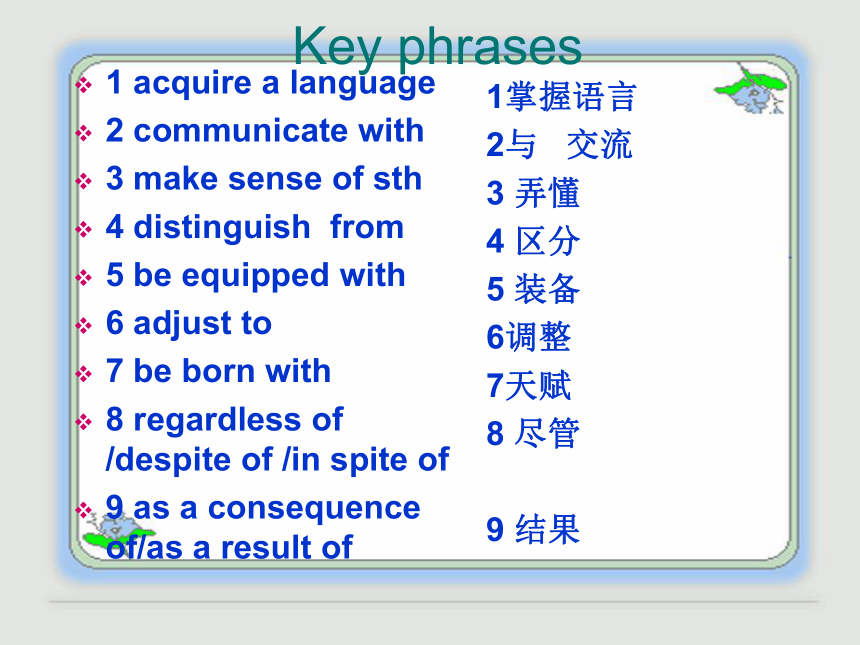
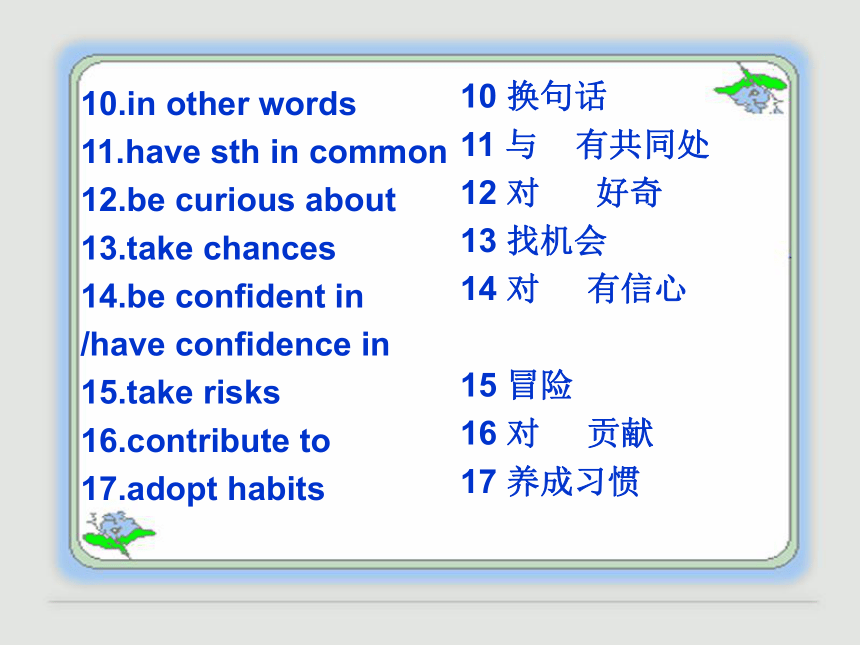


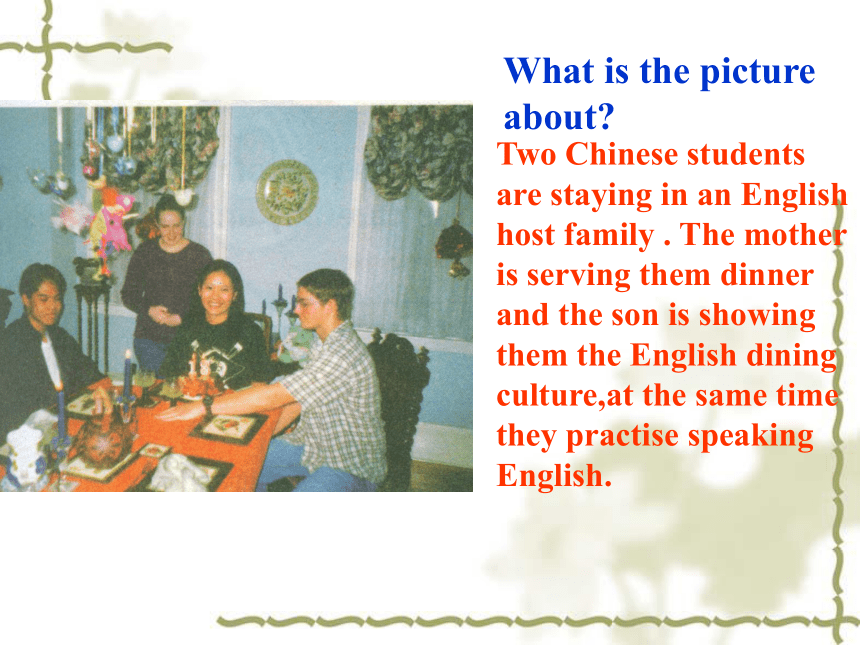
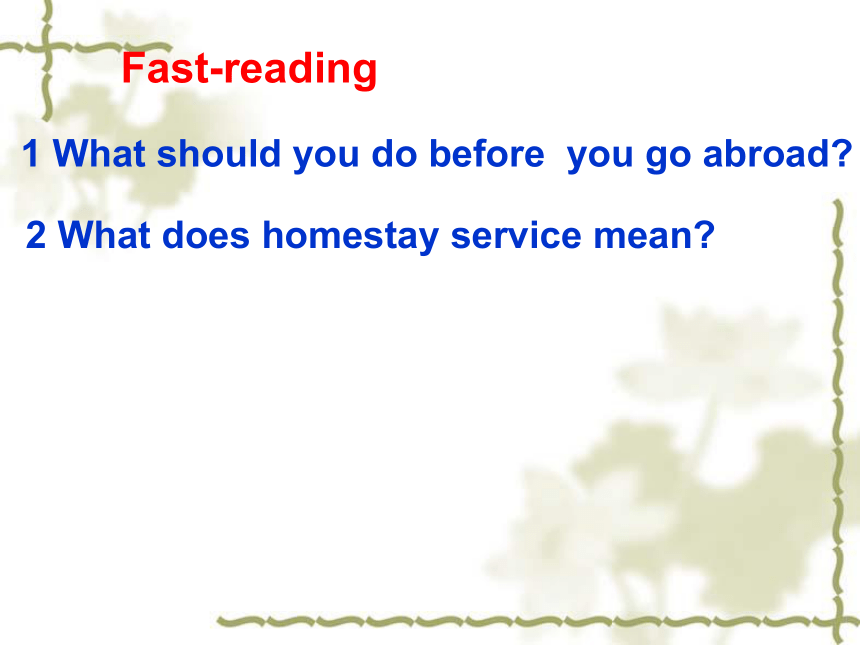
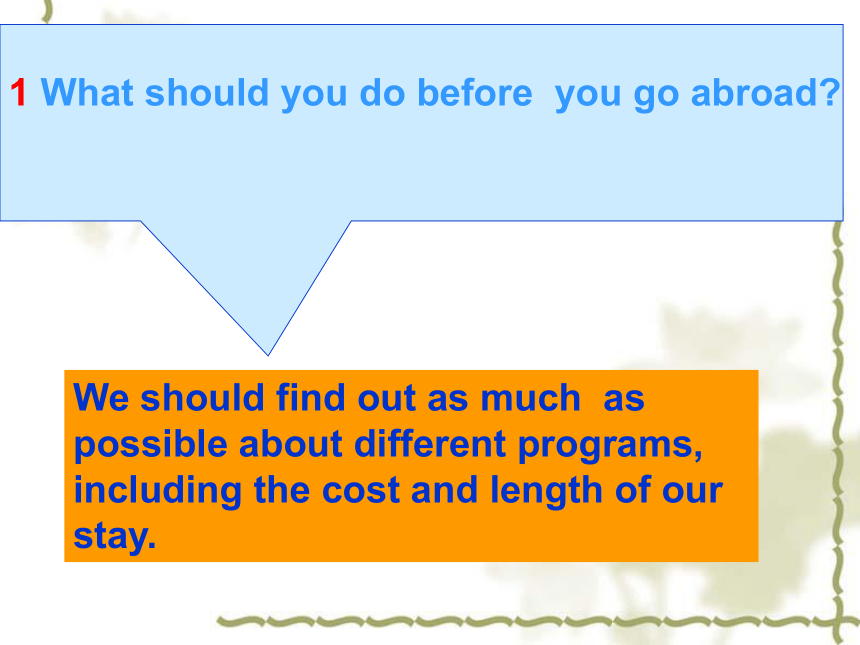
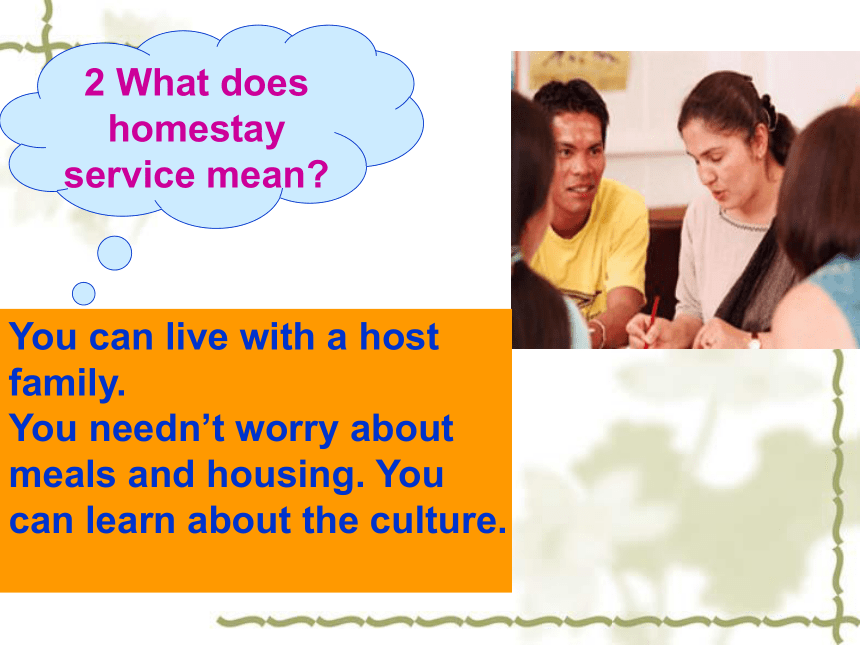
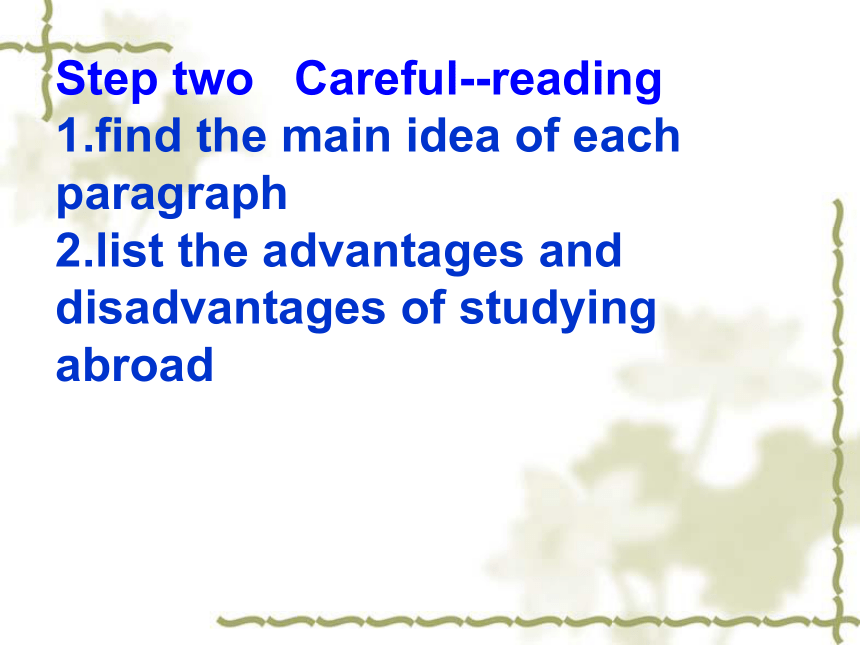
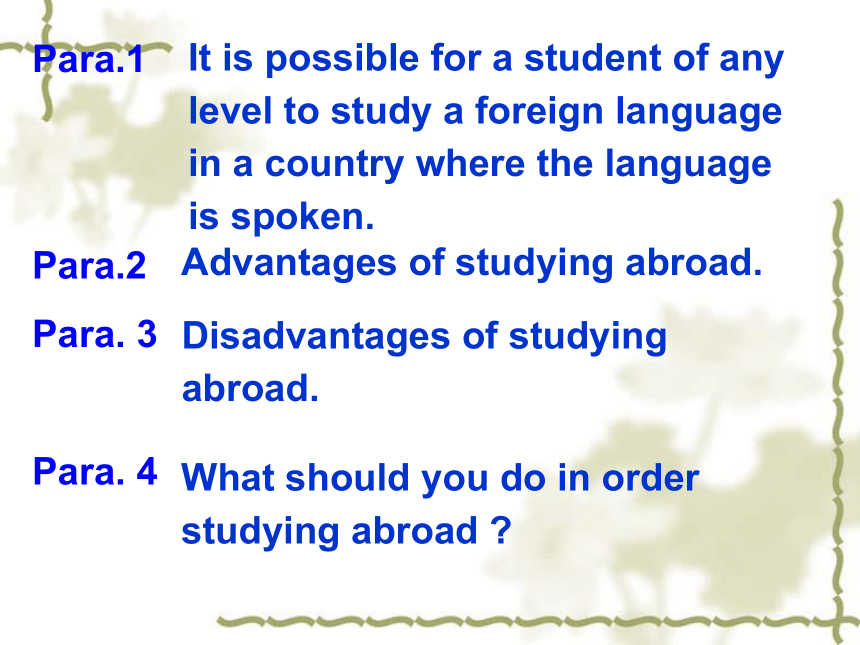
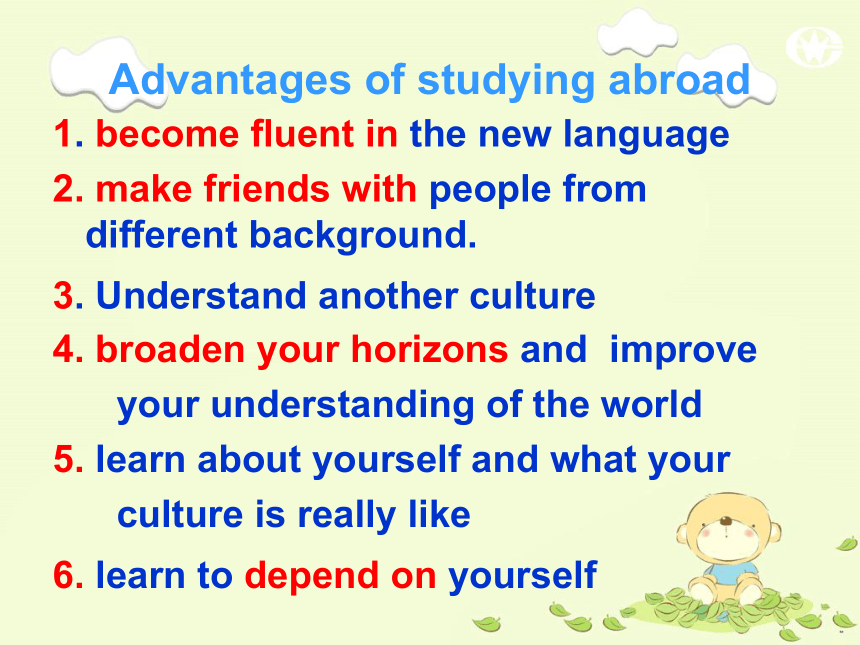

文档简介
课件55张PPT。Key phrases1 acquire a language
2 communicate with
3 make sense of sth
4 distinguish from
5 be equipped with
6 adjust to
7 be born with
8 regardless of /despite of /in spite of
9 as a consequence of/as a result of
1掌握语言
2与 交流
3 弄懂
4 区分
5 装备
6调整
7天赋
8 尽管
9 结果
10.in other words
11.have sth in common
12.be curious about
13.take chances
14.be confident in
/have confidence in
15.take risks
16.contribute to
17.adopt habits10 换句话
11 与 有共同处
12 对 好奇
13 找机会
14 对 有信心
15 冒险
16 对 贡献
17 养成习惯 Unit 8 Studying AbroadLead-in
What is the best and fastest way
to learn a foreign language? why
It is to study in a country where it is spoken because we can use language to communicate with people all the time What is the picture about?Two Chinese students are staying in an English host family . The mother is serving them dinner and the son is showing them the English dining culture,at the same time they practise speaking English.Fast-reading1 What should you do before you go abroad?2 What does homestay service mean?1 What should you do before you go abroad?We should find out as much as possible about different programs, including the cost and length of our stay.2 What does homestay service mean?You can live with a host family.
You needn’t worry about meals and housing. You can learn about the culture.
Step two Careful--reading
1.find the main idea of each paragraph
2.list the advantages and disadvantages of studying abroadPara.1
Para.2
Para. 3
Para. 4It is possible for a student of any level to study a foreign language in a country where the language is spoken.
Advantages of studying abroad.Disadvantages of studying abroad.
What should you do in order studying abroad ?
Advantages of studying abroad 1. become fluent in the new language
2. make friends with people from different background.
3. Understand another culture
4. broaden your horizons and improve
your understanding of the world
5. learn about yourself and what your
culture is really like
6. learn to depend on yourself
What are the advantages of studying abroad?Live with other students:Make friends with students from different countries and know more about the world.Learn more about the culture in that country.Homestay: Live with a host familyDisadvantages of studying abroad1. Some of them may fall behind in their
studies when studying abroad.
2.They may not be able to take classes
at the same level as at home.
3. Parents worry about the safety of
their children and may also be concerned about the cost.
Guess the meaning of the word or the phrase in red:1) Some programmes offer a “ homestay” service, ie visiting students will live with a host family.(Para. 1)A. In other words B. Otherwise C. Therefore2) “ Homestay” is perhaps the best option for younger students. (Para. 1)
A. Chance B. Choice C. part3) One year is enough to broaden your horizon and improve your understanding of the word. (Para. 2)A.使你到达更远的地方 B. 开阔你的眼界
C.让你看到地平线以外的地方4)It is very important that you find an appropriate course for you. (Para. 4)A. Interesting B. cheaper C. suitable Step Three
Choose the best answers1.The purpose of the passage is mainly to ____
A. Tell the students who want to study abroad some advice and information.
B. Teach some students how to stay abroad.
C. Help some students how to communicate with each other.
D. Explain why some students wants to stay abroad.A2.From the first paragraph we can learn of the fact ___
A. That learning abroad now is more difficult.
B. That learning abroad is not as difficult as in the past.
C. Most exchange students regarded the host family as their own and can do whatever they can in it.
D. Many students abroad offer exchang programs at various academic levels at a low cost.B3.A year in a foreign country is not just about learning a language but about help us ____.
Make friends with people from different backgrounds and understand another culture.
B. Broaden our horizons and important understanding of the world.
C.Learn morn about ourselves and our own culture.
D. All the above.D4.Which are disadvantages of exchange students’ studying abroad expect that ___
Some of them may fall behind in their studies in the beginning.
B. They always experience language and culture problem in the beginning.
C. Exchange students’ parents may worry about their children’s safety and cost.
D. Their English pronunciation will become better and better.D5.If you were offered a chance to study abroad, which of the following
Would you first do?
You need to find out as much as possible about different programmes.
B. You need to consider the cost and the length of your study.
C. You need to take more physical activityies in your school.
D. You need to say goodbye to your parents.A Discussion
If you were offered a chance to study abroad for a year, would you like to go? Why or why not?If I had the chance to study abroad for a year, I would like to go. Since just now we compared the advantages and disadvantages of studying abroad, we found the former was more than the latter. Moreover, the so-called disadvantages can be easily overcome by making efforts. Of course I will allow for my family income and will not make my parents worry about me.Summary Nowadays, many language learners have opportunities to study abroad._________ is the best option for young students, because the students needn’t worry about _______ and _______, and they can learn about the ______ in that country. Homestaymealshousingculture Studying abroad helps you meet people from different___________________ and become _______ in the new language and also learn more about _______ and your own country.countries/backgroundsfluentyourselfSummary But some of the students may _________ in their studies and have various problems. Their parents may also worry about their children’s_______ and the________.fall behindsafetycost Before you go abroad, you should find out as much as possible about different ___________, and your parents should ________________ and help you find out what is best for you.programmestake an active partGoodbyeGoodbye1. option : choice
I haven’t much option in the matter.
None of the options (选择之物)is satisfactory.
They are optional subjects(选须课) at school.
2. stay in touch( with sb )
= keep in touch ( with sb ) 与- - -保持联系
get in touch with sb 与- - - 取的联系
3. become / be fluent in: speak sth fluently
He has become so fluent in spoken English.
He speaks fluent English.
He speaks English very fluently.
4. fall behind ( sb / others )
fall sick / ill fall down跌倒
fall over 摔交 fall into 陷入; 跌入
fall off 掉下 fall in love with sb.
fall back 后退;退让 fall asleep 5. concern v.
1) 涉及, 有关
concern sb./sth. = be concerned with
Don’t trouble about things that don’t concern you.
He is said to have been concerned in the crime.
2) concern oneself with/in / about 忙于, 从事
Don’t concern yourself with novels.
3) 使担忧, 使烦恼, 使操心
Don’t let my illness concern you.
We are all concerned for/ about her safety.
concern n.
show concern for sb. 关心某人
have no concern with. 同…无关
concerning prep. 关于
He likes to refer to something concerning Chinese history.
concerned adj ( 后置定语) 有关的
the authorities concerned 有关当局
as (so) far as… be concerned 就…而言
This is all rubbish as far as I’m concerned. Language Points in the exercises
1. thanks to: owing to, due to because of
1) Thanks to the aid of the government, the
disease SARS was controlled.
2) Owing to the rain the match was cancelled.
3) The accident was due to careless driving.
2. in one’s teens : age from 13 to 19
teenager: a boy or a girl in his or her teens
She is in her teens. 3. put an end to sth : make an end of sth
come to an end 结束
at the end ( of )
in the end
1) Death put an end to his wicked career.
2) If you don’t give up crime, you’ll come to
a bad end. ( 得到报应)
3) We will have an exam at the end of the
month. 4. knock sb / sth down 撞倒
knock… into… 把- - - 敲入
knock in 敲入
knock at / on the door 敲门
knock over 打翻
knock…out of 把--- 敲出来
knock off 敲落 1) The boxer knocked his opponent down.
2) You could have knocked me down with
a feather. (= I was greatly surprised )
3) He knocked a nail into the wall.
4) It is necessary for us to knock seeds out
of the nuts before we plant then. eg. I was reading a newspaper while walking,
A fast car almost __________.
A. knocked me down B. knocked down me
C. knocked me off D. knocked me overAThank You Reading tips
1. Francis Bacon’s idea:
Read different types of books in different ways.
a. Tasting: dip into some books and read bits here and there.
Integrating Skills on P205 b. Swallowing: good stories to read and enjoy them.
c. Chewing and digesting: read slowly and carefully.
2. Read a chapter quickly to get a
general idea.
3. Do not stop every time you come to
a word or a phrase you don’t know. 4. Make guesses about the information and organization of a text.
5. Decide what to read by making a list of all the types of books you will enjoy reading.Step V Reading (P205) 1. Read the passage in 7 minutes and list the reading tips.Reading tips: 1. Read different types of books in different ways. 2.Read a chapter quickly to get a general idea. 3. Do not stop every time you come to a word or a phrase you don’t know. 4. Make guesses about the information and organization of a text. 5.Decide what to read by making a list of all the types of books you will enjoy reading. How does guessing the content of an article help you understand and remember it?
With a bit of practice, you can become good at predicting the content and organization of an article. You may also learn to predict what words will be used and what questions will be asked. The Question more guesses you make, the better you will understand the reading. If your guesses are right, you will of course understand the article and it will be easy to remember the main ideas. It doesn’ t matter if your guesses are wrong. They will help you to understand and remember the ideas better.2. Which of the following are negative reading strategies in your opinion and why?_____________________________________________________________________________________________________Because these are what prevent a reader from reading effectively and efficiently.Notes 1. dip into something
1) to put something into a liquid and
lift it out again 把……浸入(液体)中
He dipped his hand in the water.
2) to read short parts of a book,
magazine etc, but not the whole thing
[口]浏览, 翻阅一下; 略加探究 It’s the kind of book you can dip into now and again.
3) to use some of an amount of money that you have 提取(存款)
Medical bills forced her to dip into her savings.
4) to put your hand into a bag or box in order to take out one of the things inside
On her lap was a bag of candy which she kept dipping into.
2. refer to somebody / something
1) to mention or speak about someone or something提到, 谈到, 涉及
Although she didn’t mention any names, everyone knew who she was referring to. 2) to look at a book, map, piece of paper etc. for information 参考, 查阅
He gave the speech without referring to his notes.
3) if a statement, number or report etc. refers to someone or something, it is about that person or thing 针对,指
The figures refer to our sales in Europe. 3. point out 指出,说明
1) to tell someone something that he did not know or had not thought about
He was always very keen to point out my mistakes.
point out that ...
Some economists have pointed out that low inflation is not necessarily a good thing.
point something out to somebody
Thank you for pointing this out to me.
2) to show something to someone by
pointing at it 指出,把注意力引向
Luke pointed out two large birds by
the water’s edge.
I’ll point him out to you if I see him. 4. come across: to meet or find by chance 偶然遇到或找到
I came across my old college roommate in town today.
5. look out for
1) to pay attention to what is happening around you, so that you will notice a particular person or thing if you see them 当心,留心, 提防
He’s looking out for a nice apartment downtown.
2) to try to make sure that someone is treated well 照料
My older brother always looked out for me when we were kids.Homework 1. Read the passages and review the language points.
2. Finish the exercises in the grammar section in the textbook and the workbook.Euro-center in Canada for overseas language learning students. They offer exchange program s at all levels
2 communicate with
3 make sense of sth
4 distinguish from
5 be equipped with
6 adjust to
7 be born with
8 regardless of /despite of /in spite of
9 as a consequence of/as a result of
1掌握语言
2与 交流
3 弄懂
4 区分
5 装备
6调整
7天赋
8 尽管
9 结果
10.in other words
11.have sth in common
12.be curious about
13.take chances
14.be confident in
/have confidence in
15.take risks
16.contribute to
17.adopt habits10 换句话
11 与 有共同处
12 对 好奇
13 找机会
14 对 有信心
15 冒险
16 对 贡献
17 养成习惯 Unit 8 Studying AbroadLead-in
What is the best and fastest way
to learn a foreign language? why
It is to study in a country where it is spoken because we can use language to communicate with people all the time What is the picture about?Two Chinese students are staying in an English host family . The mother is serving them dinner and the son is showing them the English dining culture,at the same time they practise speaking English.Fast-reading1 What should you do before you go abroad?2 What does homestay service mean?1 What should you do before you go abroad?We should find out as much as possible about different programs, including the cost and length of our stay.2 What does homestay service mean?You can live with a host family.
You needn’t worry about meals and housing. You can learn about the culture.
Step two Careful--reading
1.find the main idea of each paragraph
2.list the advantages and disadvantages of studying abroadPara.1
Para.2
Para. 3
Para. 4It is possible for a student of any level to study a foreign language in a country where the language is spoken.
Advantages of studying abroad.Disadvantages of studying abroad.
What should you do in order studying abroad ?
Advantages of studying abroad 1. become fluent in the new language
2. make friends with people from different background.
3. Understand another culture
4. broaden your horizons and improve
your understanding of the world
5. learn about yourself and what your
culture is really like
6. learn to depend on yourself
What are the advantages of studying abroad?Live with other students:Make friends with students from different countries and know more about the world.Learn more about the culture in that country.Homestay: Live with a host familyDisadvantages of studying abroad1. Some of them may fall behind in their
studies when studying abroad.
2.They may not be able to take classes
at the same level as at home.
3. Parents worry about the safety of
their children and may also be concerned about the cost.
Guess the meaning of the word or the phrase in red:1) Some programmes offer a “ homestay” service, ie visiting students will live with a host family.(Para. 1)A. In other words B. Otherwise C. Therefore2) “ Homestay” is perhaps the best option for younger students. (Para. 1)
A. Chance B. Choice C. part3) One year is enough to broaden your horizon and improve your understanding of the word. (Para. 2)A.使你到达更远的地方 B. 开阔你的眼界
C.让你看到地平线以外的地方4)It is very important that you find an appropriate course for you. (Para. 4)A. Interesting B. cheaper C. suitable Step Three
Choose the best answers1.The purpose of the passage is mainly to ____
A. Tell the students who want to study abroad some advice and information.
B. Teach some students how to stay abroad.
C. Help some students how to communicate with each other.
D. Explain why some students wants to stay abroad.A2.From the first paragraph we can learn of the fact ___
A. That learning abroad now is more difficult.
B. That learning abroad is not as difficult as in the past.
C. Most exchange students regarded the host family as their own and can do whatever they can in it.
D. Many students abroad offer exchang programs at various academic levels at a low cost.B3.A year in a foreign country is not just about learning a language but about help us ____.
Make friends with people from different backgrounds and understand another culture.
B. Broaden our horizons and important understanding of the world.
C.Learn morn about ourselves and our own culture.
D. All the above.D4.Which are disadvantages of exchange students’ studying abroad expect that ___
Some of them may fall behind in their studies in the beginning.
B. They always experience language and culture problem in the beginning.
C. Exchange students’ parents may worry about their children’s safety and cost.
D. Their English pronunciation will become better and better.D5.If you were offered a chance to study abroad, which of the following
Would you first do?
You need to find out as much as possible about different programmes.
B. You need to consider the cost and the length of your study.
C. You need to take more physical activityies in your school.
D. You need to say goodbye to your parents.A Discussion
If you were offered a chance to study abroad for a year, would you like to go? Why or why not?If I had the chance to study abroad for a year, I would like to go. Since just now we compared the advantages and disadvantages of studying abroad, we found the former was more than the latter. Moreover, the so-called disadvantages can be easily overcome by making efforts. Of course I will allow for my family income and will not make my parents worry about me.Summary Nowadays, many language learners have opportunities to study abroad._________ is the best option for young students, because the students needn’t worry about _______ and _______, and they can learn about the ______ in that country. Homestaymealshousingculture Studying abroad helps you meet people from different___________________ and become _______ in the new language and also learn more about _______ and your own country.countries/backgroundsfluentyourselfSummary But some of the students may _________ in their studies and have various problems. Their parents may also worry about their children’s_______ and the________.fall behindsafetycost Before you go abroad, you should find out as much as possible about different ___________, and your parents should ________________ and help you find out what is best for you.programmestake an active partGoodbyeGoodbye1. option : choice
I haven’t much option in the matter.
None of the options (选择之物)is satisfactory.
They are optional subjects(选须课) at school.
2. stay in touch( with sb )
= keep in touch ( with sb ) 与- - -保持联系
get in touch with sb 与- - - 取的联系
3. become / be fluent in: speak sth fluently
He has become so fluent in spoken English.
He speaks fluent English.
He speaks English very fluently.
4. fall behind ( sb / others )
fall sick / ill fall down跌倒
fall over 摔交 fall into 陷入; 跌入
fall off 掉下 fall in love with sb.
fall back 后退;退让 fall asleep 5. concern v.
1) 涉及, 有关
concern sb./sth. = be concerned with
Don’t trouble about things that don’t concern you.
He is said to have been concerned in the crime.
2) concern oneself with/in / about 忙于, 从事
Don’t concern yourself with novels.
3) 使担忧, 使烦恼, 使操心
Don’t let my illness concern you.
We are all concerned for/ about her safety.
concern n.
show concern for sb. 关心某人
have no concern with. 同…无关
concerning prep. 关于
He likes to refer to something concerning Chinese history.
concerned adj ( 后置定语) 有关的
the authorities concerned 有关当局
as (so) far as… be concerned 就…而言
This is all rubbish as far as I’m concerned. Language Points in the exercises
1. thanks to: owing to, due to because of
1) Thanks to the aid of the government, the
disease SARS was controlled.
2) Owing to the rain the match was cancelled.
3) The accident was due to careless driving.
2. in one’s teens : age from 13 to 19
teenager: a boy or a girl in his or her teens
She is in her teens. 3. put an end to sth : make an end of sth
come to an end 结束
at the end ( of )
in the end
1) Death put an end to his wicked career.
2) If you don’t give up crime, you’ll come to
a bad end. ( 得到报应)
3) We will have an exam at the end of the
month. 4. knock sb / sth down 撞倒
knock… into… 把- - - 敲入
knock in 敲入
knock at / on the door 敲门
knock over 打翻
knock…out of 把--- 敲出来
knock off 敲落 1) The boxer knocked his opponent down.
2) You could have knocked me down with
a feather. (= I was greatly surprised )
3) He knocked a nail into the wall.
4) It is necessary for us to knock seeds out
of the nuts before we plant then. eg. I was reading a newspaper while walking,
A fast car almost __________.
A. knocked me down B. knocked down me
C. knocked me off D. knocked me overAThank You Reading tips
1. Francis Bacon’s idea:
Read different types of books in different ways.
a. Tasting: dip into some books and read bits here and there.
Integrating Skills on P205 b. Swallowing: good stories to read and enjoy them.
c. Chewing and digesting: read slowly and carefully.
2. Read a chapter quickly to get a
general idea.
3. Do not stop every time you come to
a word or a phrase you don’t know. 4. Make guesses about the information and organization of a text.
5. Decide what to read by making a list of all the types of books you will enjoy reading.Step V Reading (P205) 1. Read the passage in 7 minutes and list the reading tips.Reading tips: 1. Read different types of books in different ways. 2.Read a chapter quickly to get a general idea. 3. Do not stop every time you come to a word or a phrase you don’t know. 4. Make guesses about the information and organization of a text. 5.Decide what to read by making a list of all the types of books you will enjoy reading. How does guessing the content of an article help you understand and remember it?
With a bit of practice, you can become good at predicting the content and organization of an article. You may also learn to predict what words will be used and what questions will be asked. The Question more guesses you make, the better you will understand the reading. If your guesses are right, you will of course understand the article and it will be easy to remember the main ideas. It doesn’ t matter if your guesses are wrong. They will help you to understand and remember the ideas better.2. Which of the following are negative reading strategies in your opinion and why?_____________________________________________________________________________________________________Because these are what prevent a reader from reading effectively and efficiently.Notes 1. dip into something
1) to put something into a liquid and
lift it out again 把……浸入(液体)中
He dipped his hand in the water.
2) to read short parts of a book,
magazine etc, but not the whole thing
[口]浏览, 翻阅一下; 略加探究 It’s the kind of book you can dip into now and again.
3) to use some of an amount of money that you have 提取(存款)
Medical bills forced her to dip into her savings.
4) to put your hand into a bag or box in order to take out one of the things inside
On her lap was a bag of candy which she kept dipping into.
2. refer to somebody / something
1) to mention or speak about someone or something提到, 谈到, 涉及
Although she didn’t mention any names, everyone knew who she was referring to. 2) to look at a book, map, piece of paper etc. for information 参考, 查阅
He gave the speech without referring to his notes.
3) if a statement, number or report etc. refers to someone or something, it is about that person or thing 针对,指
The figures refer to our sales in Europe. 3. point out 指出,说明
1) to tell someone something that he did not know or had not thought about
He was always very keen to point out my mistakes.
point out that ...
Some economists have pointed out that low inflation is not necessarily a good thing.
point something out to somebody
Thank you for pointing this out to me.
2) to show something to someone by
pointing at it 指出,把注意力引向
Luke pointed out two large birds by
the water’s edge.
I’ll point him out to you if I see him. 4. come across: to meet or find by chance 偶然遇到或找到
I came across my old college roommate in town today.
5. look out for
1) to pay attention to what is happening around you, so that you will notice a particular person or thing if you see them 当心,留心, 提防
He’s looking out for a nice apartment downtown.
2) to try to make sure that someone is treated well 照料
My older brother always looked out for me when we were kids.Homework 1. Read the passages and review the language points.
2. Finish the exercises in the grammar section in the textbook and the workbook.Euro-center in Canada for overseas language learning students. They offer exchange program s at all levels
